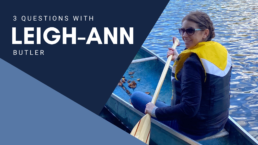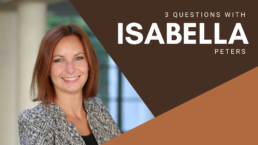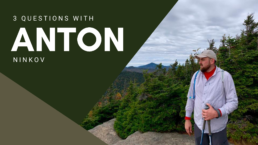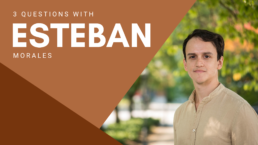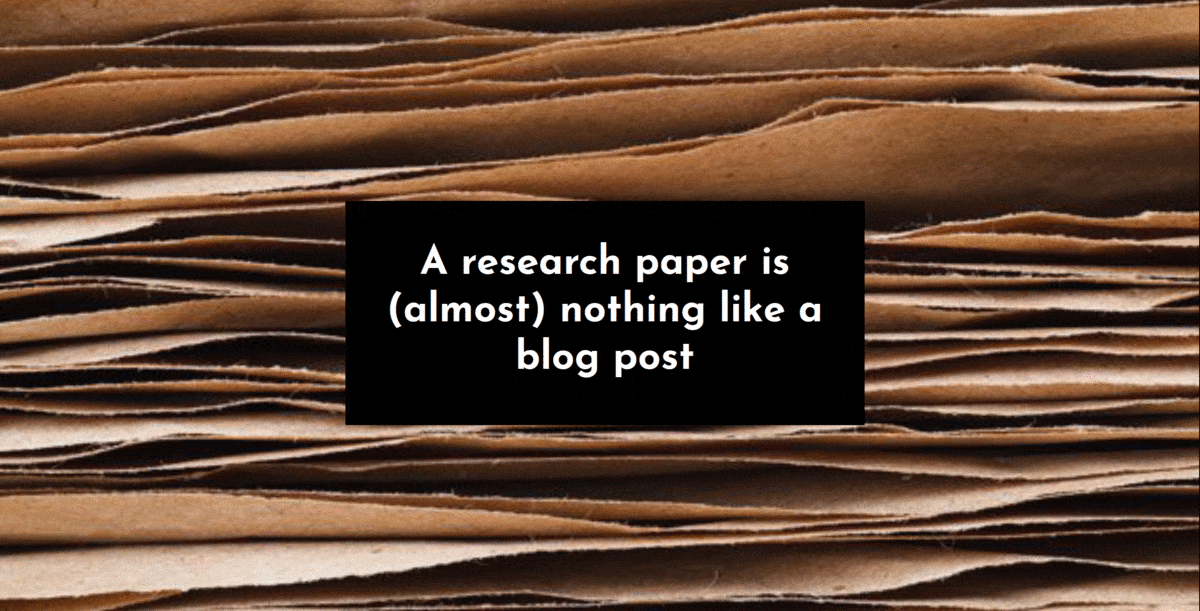Three questions with…. Sanam!
Our lab is growing! In our Three Questions series, we’re profiling each of our members and the amazing work they’re doing.
In today’s post, we spoke with Sanam Ebrahimzadeh, a postdoctoral fellow at the Ottawa Hospital Research Institute and a research associate at the ScholCommLab. In this post, she tells us more about her research—a fascinating blend of work on data sharing, scholarly metrics, accuracy reviews, and more.

Q#1 What are you working on at the lab?
I am working on the Metrics Literacies project with Dr. Stefanie Haustein, Alyssa Jeffrey, Isabelle Dorsch, and Dr. Lauren Maggio. We are trying to reduce the misuse of metrics (and the adverse effects that come with that misuse). We hope to improve the understanding and use of scholarly metrics in academia through the development, testing, and dissemination of multimedia resources. It is an exciting project since it brings together an interdisciplinary team of bibliometricians, education scholars, media producers, and science communicators. It seeks to support researchers and research administrators in developing metrics literacies.
Q#2 Tell us about a recent paper, presentation, or project you’re proud of.
I am working as a postdoctoral fellow at the Ottawa Hospital Research Institute on Transparency and Openness Practices for academic institutions, data sharing, and Cochrane rapid diagnostic test accuracy reviews projects with Dr. David Moher and Dr. Matthew McInnes. I am really proud of this since it allows me to work with a wonderful team from the Journalology and the Epidemiology communities.
Q#3 What’s the best (or worst) piece of advice you’ve ever received?
The best advice came from Louis Pasteur. He said: “Whether our efforts are, or not, favoured by life, let us be able to say, when we come near the great goal, 'I have done what I could.’”
“Whether our efforts are, or not, favoured by life, let us be able to say, when we come near the great goal, 'I have done what I could.’”
Louis Pasteur
You can find Sanam on Twitter at @Sanemebp.
In the rush for coronavirus information, unreviewed scientific papers are being publicized

(Shutterstock)
Alice Fleerackers, Simon Fraser University and Juan Pablo Alperin, Simon Fraser University
COVID-19 has not only upended our personal lives, it has dramatically changed scientific research. In response to the rapid spread of the virus, scientists around the world have had to find new ways to collaborate and solve problems, all at speeds previously thought unimaginable. Indeed, until very recently, the idea that a new vaccine could be developed, tested and distributed in less than a year would have seemed impossible.
The rapid pace at which science is moving is exciting. In addition to producing vaccines, scientists have found ways to prevent the virus from spreading, dispel pandemic myths and identify communities most at risk of falling ill. But the “warp speed” at which science is moving can also be dangerous, especially when inconclusive or unverified research studies gain public attention.
As researchers studying science and health communication, our team has been paying close attention to the way one form of preliminary research — the preprint — makes its way to audiences.
What are preprints?
Preprints are scientific manuscripts that are posted online but haven’t been formally verified by the scientific community. Scientists use them for many reasons, from getting early feedback on new work to sharing findings that are important but may never make it into a journal.
Preprints can also help make research more accessible because they are free to read, while many journal articles are not. They can also be published by scientists without any delays, as opposed to the many months (or even years) it takes for a study to go through peer review and be published in a journal.
For some findings, waiting for a paper to pass through two or three independent researchers — or academic peers — who read the study and assess its rigour, originality and significance, is a manageable delay. But for others — like those about promising new drugs, prevention strategies or medical therapies — speed can make a big difference. In these cases, posting a preprint means that other scientists can start working on replicating the results right away, potentially allowing new treatments or vaccines to be approved months or even years ahead of schedule.
This speed advantage is one reason that preprint use has skyrocketed during the COVID-19 pandemic. When almost 800,000 people worldwide are falling ill every week, faster science isn’t just about convenience: It’s about saving lives.
Preprints in the COVID-19 pandemic
While preprints have an obvious advantage for scientists, things can get tricky when these preliminary studies make their way outside of the scientific community.
Early in the pandemic, for example, two high profile preprints linking tobacco and COVID-19 prevention started to receive a lot of media coverage. Although the studies turned out to be highly flawed, many readers took the findings to heart, sparking unnecessary panic and encouraging smoking.
The tentative nature of preprints is one reason journalists have historically been discouraged from reporting on them. But with the onset of the pandemic, and few relevant peer-reviewed studies to draw on, journalists were left with little choice but to cover these preliminary reports.
Indeed, in the early months of the pandemic, COVID-19-related preprints were more than 200 times as likely to receive media coverage than preprints on other topics, according to a study posted (as a preprint) last year.
In our peer-reviewed study, we found that, unfortunately, the preliminary nature of these studies wasn’t always communicated consistently. Of the more than 450 media stories we analyzed, only about half accurately portrayed preprints as being uncertain or unverified research.
Surprisingly, it wasn’t just the newer, less traditional media outlets that failed to identify the research as preprints. Even established publications like the New York Times did not always describe the preprints they covered as preliminary.
Staying critical and informed as science evolves
While this coverage of preprints isn’t in and of itself a bad thing, it can be dangerous if the tentative nature of the science isn’t made transparent. Luckily, journalism associations are starting to develop recommendations for covering preprints responsibly.
Preprint servers, or online collections, like bioRxiv and medRxiv, have also started posting “warning” messages alongside new studies to remind readers not to treat the findings as established facts.
Until these best practices become commonplace, however, it’s up to all of us to develop the skills we need to make responsible and well-founded decisions about our health. Learn to read science papers critically, remember to fact check questionable claims, and, most importantly, always think before you share.
As science communicator Liz Neeley so aptly put it, “We are all science communicators now: COVID-19 has conscripted us.” Preprints may be here to stay, but if we learn to communicate responsibly about this preliminary research, the confusion they generate doesn’t have to be.![]()
Alice Fleerackers, PhD Student, Interdisciplinary Studies, Simon Fraser University and Juan Pablo Alperin, Assistant Professor, Simon Fraser University
This article is republished from The Conversation under a Creative Commons license. Read the original article.
Three questions with…. Michelle!
Our lab is growing! In our Three Questions series, we’re profiling each of our members and the amazing work they’re doing.
Today, we’re highlighting Michelle La, a master’s student studying the subculture of sneaker enthusiasts at Simon Fraser University (SFU) and a research assistant at the ScholCommLab. In this post, she tells us about her research on the pressures facing early-career academics, her efforts to help train teaching assistants for remote education, and more.

Q#1 What are you working on at the lab?
At the lab I work on the qualitative research components of the Review, Promotion, and Tenure (RPT) project. Specifically, I survey the RPT requirements and corresponding documentation from research-oriented institutions across North America. I am interested in the ways these institutions frame the value of academic outputs in their RTP documents (e.g. publishing in a high impact journal versus in an open access journal). By doing this, I can see the ways institutions covertly and overtly use language to discourage pre-tenured faculty from disseminating their research in non-traditional academic ways, such as through social media, podcasting, open access platforms, etc.
By doing this [research,] I can see the ways institutions covertly and overtly use language to discourage pre-tenured faculty from disseminating their research in non-traditional academic ways
Michelle La
Q#2 Tell us about a recent paper, presentation, or project you’re proud of.
In the late spring of 2020, SFU was pivoting to remote learning due to the pandemic. I worked with SFU’s Centre for Educational Excellence to develop the university’s first comprehensive course to help train TAs/TMs (teaching assistants and tutor markers) for teaching in the remote environment. The modules were developed and informed by my teaching experience having taught hundreds of students as a TA/TM. So far, the course has received over 38,000-page views from TAs, TMs, and instructors throughout the university. Working on that project is one of my proudest accomplishments as a graduate student.
Q#3 What’s the best (or worst) piece of advice you’ve ever received?
The best piece of advice that I am going to heed into 2021 is to actively practice self-compassion. I was inspired by The Happiness Lab podcast episode “Dump Your Inner Drill Sergeant,” where researcher and author Kristin Neff discusses the plethora of benefits that practising self-compassion can bring to yourself and the others around you.
Almost half of media stories fail to label 'preprint' COVID-19 research
Press release originally published by Simon Fraser University on January 6, 2021

A new SFU-led study finds that almost half of media stories in early 2020 featuring COVID-19 'preprint' research—research that has not yet been peer-reviewed—accurately framed the studies as being preprints or unverified research.
SFU PhD student Alice Fleerackers, a researcher in the Scholarly Communications Lab, and publishing program professor Juan Pablo Alperin collaborated with an international team of researchers to analyze more than 500 mentions in over 450 stories from digital news outlets covering preprint COVID-19 research. The study was published this week in Health Communication.
Their analysis is based on 100 COVID-19 preprints posted on top-ranked preprint servers medRxiv and bioRxiv from January 1 to April 30, 2020.
"We found that it wasn't just newer, less 'traditional' media outlets, like Medium or Yahoo! News that did not accurately identify the research as preprint or preliminary," Fleerackers says. "Even established publications like The New York Times and The Guardian did not consistently describe the preprints they covered as unreviewed."
The media's coverage of COVID-19 preprints may in part be a reflection of larger pressures facing the scientific community. "The urgency of the pandemic required researchers and journalists to sacrifice the assurances of peer review for more rapid publication," Alperin explains. "Just as researchers are adjusting to the new way of rapidly communicating among each other, so too are journalists figuring out how that greater uncertainty needs to be conveyed to the public."
Fleerackers notes that coverage of preprint research can be helpful to the public. For example, sharing findings about promising prevention strategies as early as possible can save lives. But it can also undermine the public's trust in the media if a preprint is mischaracterized as widely accepted science but the findings are later discredited.
"We saw this with a couple of high profile preprints published at the beginning of the pandemic, for example, which linked tobacco to COVID-19 prevention," she explains. "These studies were highly flawed, but they got a ton of media coverage—sparking unnecessary panic and even encouraging some people to pick up smoking."
The early months of the pandemic offered few examples of best practices to turn to and the science continued to evolve, rapidly changing what was known about the virus and how the public could best protect themselves from becoming infected. Fleerackers adds that reporters covering coronavirus often had little or no expertise in health and science.
"Journalists have not had an easy year. All things considered, I'm impressed with what they've been able to accomplish despite the odds," she says. "And overall, audiences seem to be responding well. Many countries saw a boost in news consumption during the early stages of the pandemic, and trust in journalism has been high."
Read the full paper at Health Communication or find out more at the project website.
Three questions with...Leigh-Ann!
Our lab is growing! In our Three Questions series, we're profiling each of our members and the amazing work they're doing.
Today, we're highlighting Leigh-Ann Butler, a master’s student at the University of Ottawa’s School of Information Studies, a Policy Analyst at the Natural Sciences and Engineering Research Council (NSERC), and a research assistant at the ScholCommLab.
In this post, Leigh-Ann tells us more about her research on open access publishing, her forays into scholarly podcasting, and more.
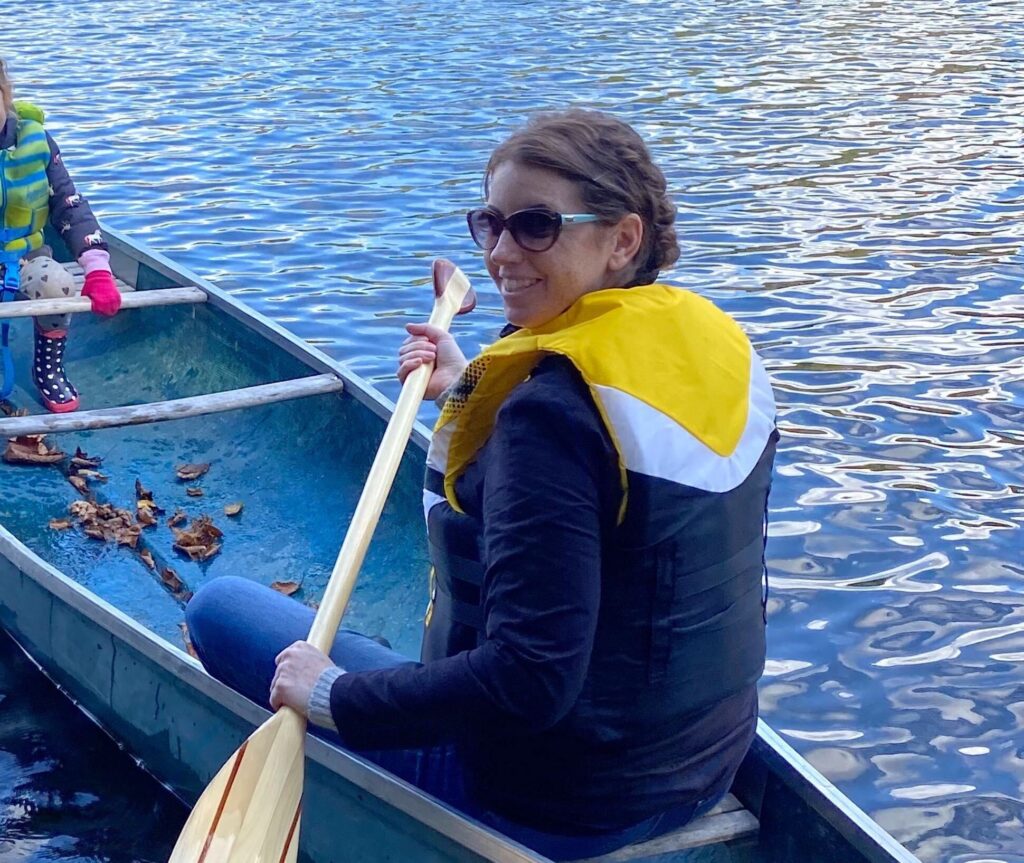
Q#1 What are you working on at the lab?
Currently, I am working with Stefanie Haustein, Philip Mongeon, Lisa Matthias, and Marc-Andre Simard on a study that examines the cost of Open Access publishing and the revenues these costs generate for scholarly publishers. More specifically, we are examining the amount of article processing charges (APCs) paid by the research community for publishing in gold and hybrid journals. This study will tie in to my master's thesis, where I will examine the amount of APCs paid by Canadian funded researchers for OA (gold and hybrid) publications. I’m really excited by my research topic. I think it’s valuable to examine how much of our public tax dollars (through federal grants) essentially flow into the OA revenue stream.
"I think it’s valuable to examine how much of our public tax dollars (through federal grants) essentially flow into the OA revenue stream."
Leigh-Ann Butler
Q#2 Tell us about a recent paper, presentation, or project you’re proud of.
My experiences are limited at this point, since I’m really just starting my journey with my master’s thesis. There were several projects I was proud of during my Masters of Information Studies program, including a podcast I created with Lina Harper, another SCL member, for Stefanie’s Information Literacy course. We interviewed librarians to discuss the Association of College & Research Libraries’ framework for information literacy. The University of Ottawa has a podcast studio, and it was a lot of fun to chat with the librarians in that setting. Everyone really enjoyed the experience.

Stay tuned, though: I hope to have my thesis done by summer (fingers crossed), and I’m excited to fill you in on what I discover!
Q#3 What’s the best (or worst) piece of advice you’ve ever received?
The best advice came from my mom who, like me, completed a thesis later in her career. Unlike me, she was also battling cancer during that time. I’ve asked how she got through her degree during her illness and she told me her education reminded her of what was to come post-illness, and that it was only a matter of time until she reached that goal. I just appreciate her mindset—that time and determination will lead you to your goals if you continue to keep them in focus.
Find Leigh-Ann on Twitter at @Lkbutler16.
Three questions with… Isabella!
Our lab is growing! In our Three Questions series, we’re profiling each of our members and the amazing work they’re doing.
Today, we’re highlighting Isabella Peters, a new research associate at the ScholCommLab and a professor of Web Science at the ZBW Leibniz Information Centre for Economics and CAU Kiel University. In this post, she tells us more about what she’s working on at the lab, and offers advice for making the most of academia.

Q#1 What are you working on at the lab?
I just started to work with Stefanie Haustein, Kathleen Gregory, and Anton Ninkov on the Meaningful Data Counts (MDC) project. Together, we are trying to make sense of the data citations provided by the DataCite initiative. Also, we hope to learn more about the hidden processes that drive researchers’ decisions to cite or not cite data. It is quite an exciting project since we’ll be combining different quantitative and qualitative methods.
Q#2 Tell us about a recent paper, presentation, or project you’re proud of.
I am actually very proud about the MDC project, since it allows me to work with wonderful people from the ScholCommLab, DataCite, and the bibliometrics community. Most of the people I have known for more than 10 years now, which makes every project meeting feel like a gathering of friends. It's awesome!
"Most of the people I have known for more than 10 years now, which makes every project meeting feel like a gathering of friends."
Isabella Peters
Q#3 What’s the best (or worst) piece of advice you’ve ever received?
Wow, that is a difficult question. I am not sure whether I have received this advice or whether it is the advice I would give other academics now—but here it is: Have fun and enjoy the journey!
Find out more on Isabella’s website or follow her on Twitter.
Three questions with...Lina!
Our lab is growing! In our Three Questions series, we're profiling each of our members and the amazing work they're doing.
Today, we're highlighting Lina Marie Harper: a master's student in Information Science at the University of Ottawa, a researcher at the ScholCommLab, and the proud owner of a "chiweenie" (part Dachshund, part Chihuahua).
In this post, she tells us about the joys of open data, graduate school, true crime, and more.
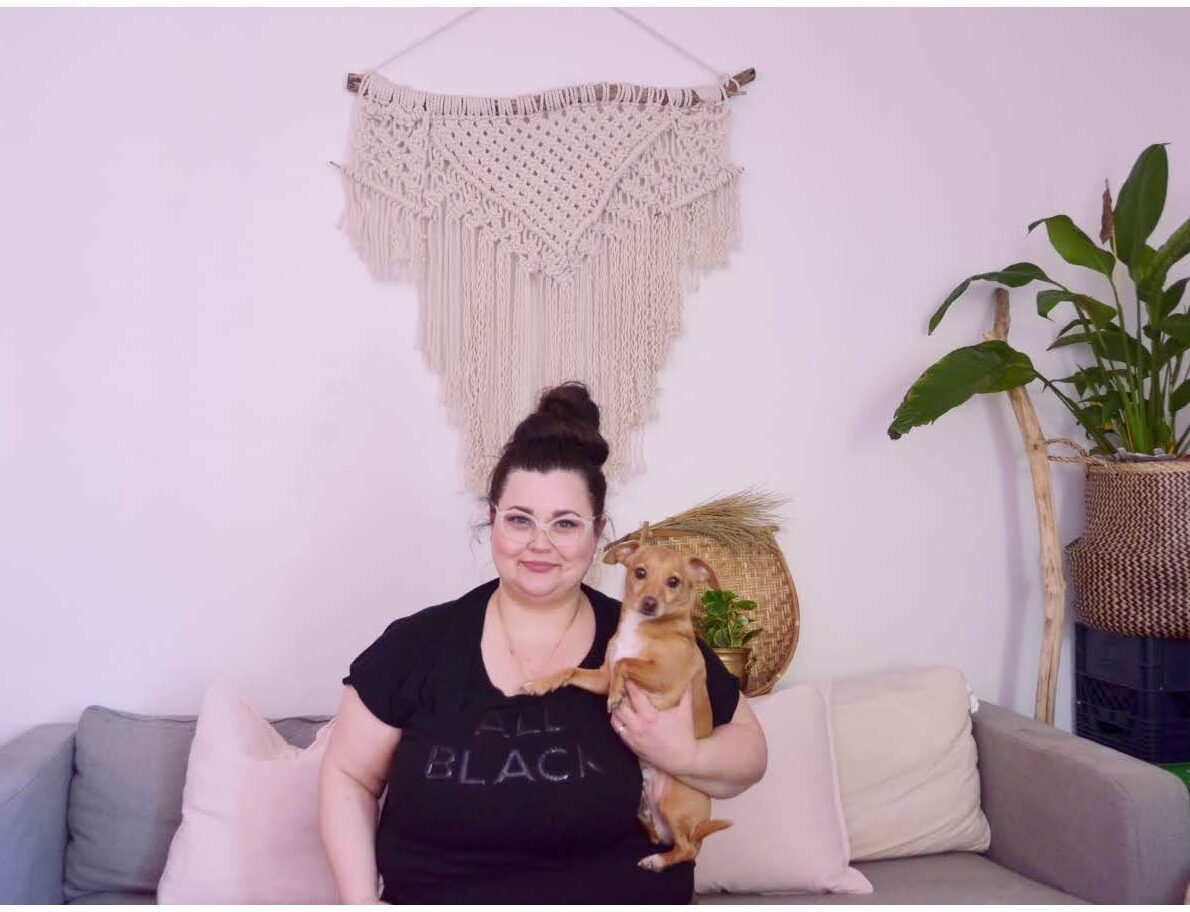
Q#1 What are you working on at the lab?
I'm working on a few things for the lab. But one of the highlights, so far, has been the Research Data Management Plan (RDMP) for the Meaningful Data Counts (MDC) project, which I worked on over the summer in a team of four. I’d been contributing to the lab’s MDC project for a while by then, using mixed social sciences research methods to explore the role that datasets play in scholarly communication. As part of that work, we were commissioned by the Portage Network to craft an RDMP exemplar that describes how data is handled in our project. As both of the project’s Principal Investigators practice open science and scholarship, the final plan puts an emphasis on data sharing and reuse.
The other highlight, for sure, has been writing a graduate-level thesis! It’s exciting to take on this type of project because it’s like the culmination of all the things that I’ve been analyzing and dissecting for the past two years in the Information Studies Masters program. It’s going to be the longest written piece of work I've ever done by far, and I am so proud to be working on it. I am the first person in my family with an (almost finished) MA (mom’s side) and the first person with an undergraduate degree on my dad’s side (I have a BA in Women’s Studies and Communications from Concordia). My master’s research will hopefully help with the qualitative aspect of the MDC project, as I’ll be looking at researchers’ motivations to reuse data in the social sciences and humanities sector.
I am so proud to be working on [my thesis]. I am the first person in my family with an (almost finished) MA
Lina Harper
Q#2 Tell us about a recent paper, presentation, or project you’re proud of.
In May, I was invited to share my working research for the 26th Annual SPRU PhD Forum 2020, a platform for PhD researchers to connect, share, and learn from each other.
As a guest for Information Technologies: Practices, Imaginaries, and Futures, a panel with the ST Global Consortium, I presented a talk called “Information Scientists: Data curation and the evolving role of research librarians.” The event was live streamed for conference participants in Sussex, UK, so I had to wake up super early to connect—plus, I was beaucoup nervous—but it went really well. I learned that practicing with your Ottawa Lab friends makes perfect (thanks, Stefanie, Alyssa, Leigh-Ann, and Erica for being my sounding board!)
I also have two other projects I want to shamelessly brag about. The first is a preprint called 10 Women of Digital Humanities that I posted last spring. I completed the research in the winter of 2020, in a class called Linked Open Data in the Humanities taught by Canada Research Chair in Digital Humanities, Constance Crompton. The project was about linked open data — I tracked the digital object identifiers and tweets of 10 female DH scholars, randomly chosen from this list. The coolest part was adding metadata and linking items to Wikidata pages.
Finally, I want to briefly mention Searching as Information Literacy—an open educational resource lesson plan and podcast, an online educational resource we just published on Zenodo. The resource unpacks the frame "Searching As Strategic Exploration" from ACRL’s Framework for Information Literacy, six concepts that organize ways to teach post-secondary students about selecting and appraising credible information and research. It includes a podcast, blog, and learning exercise by yours truly, Leigh-Ann Butler, and Andrea Lobel.
Q#3 What’s the best (or worst) piece of advice you’ve ever received?
“Stay sexy and don’t get murdered.” This is one of my mantras. It’s a piece of advice from a true crime podcast by two comedians, Karen Kilgariff and Georgia Hardstark. The show has brought together a community of women (online) with one thing in common: navigating this world as a woman (or woman-identified person) can be dangerous.
In a world of perpetual violence against women, this is real world advice that asks, “if you have to choose between being polite or staying safe and fighting back — forget politeness.”
Find Lina on Twitter, LinkedIn, and ORCID.
Three questions with… Anton!
Our lab is growing! In our Three Questions series, we’re profiling each of our members and the amazing work they’re doing.
Today, we’re highlighting Anton Ninkov, a recent graduate of Western University’s PhD in Library and Information Science program and the ScholCommLab’s newest postdoctoral fellow. In this post, he tells us more about what he’s up to inside and outside of the lab. He also offers advice for how to manage stress—whether you're a competitive bobsledder, an emerging scholar, or something in between.
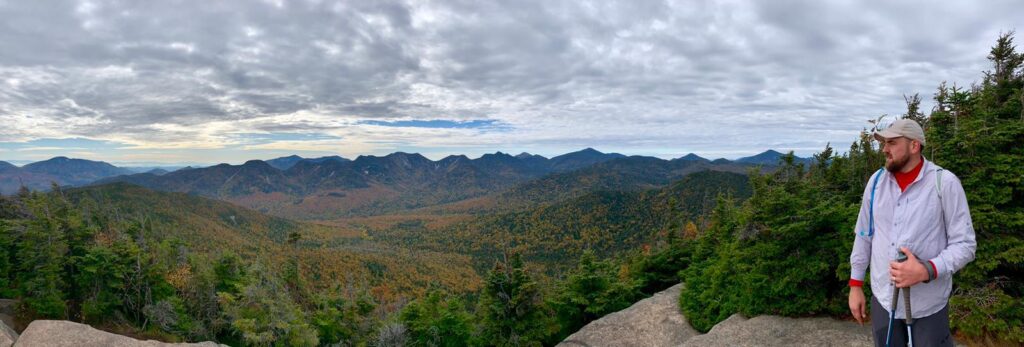
Q#1 What are you working on at the lab?
I am working as a postdoctoral fellow at the University of Ottawa, School of Information Studies on the Sloan-funded Meaningful Data Counts project with Dr. Stefanie Haustein. I am going to be investigating dataset citations and reuse to understand the role that data plays in scholarly communication. This will involve mixed methods research, and hopefully the development of a visual analytics tool that make understanding this information space easier. I am currently getting more familiar with DataCite’s data and coming up with a plan on how we can leverage this resource to help with the goals of this project. I have only just started, so I have a lot to learn!
Q#2 Tell us about a recent paper, presentation, or project you’re proud of.
I just finished my PhD in Library and Information Science at Western University. The title of my thesis was Making sense of online public health debates with visual analytics systems. My research focused on the development and user-study of a visual analytics system for making sense of the online debate about vaccines. I then took the findings from this project and developed a framework for developing similar visual analytics systems for any online public health debate. I am particularly proud of the cross-disciplinary nature of my PhD, incorporating information science with computer science and human-information interaction.
Q#3 What’s the best (or worst) piece of advice you’ve ever received?
The best advice I’ve ever received was from my parents, but it also came from the movie Cool Runnings. In the film, there is a scene where the coach of the Jamaican Bobsled Team (John Candy) tells the team captain (Leon Robinson): “A gold medal is a wonderful thing, but if you’re not enough without it, you’ll never be enough with it.” My parents gave me this same advice when I had anxiety while swimming for the University of Ottawa Gee-Gees in 2010. It was helpful then but has stuck with me beyond the world of competitive sports. No matter what goals I have in mind, it is important for me to live in a way that I am proud of myself with or without the material achievement. This approach to life makes the inevitable ups and downs of doing anything much more manageable.
“A gold medal is a wonderful thing, but if you’re not enough without it, you’ll never be enough with it.”
John Candy, Cool Runnings
Find out more about Anton on his website, Twitter, or LinkedIn.
Three questions with...Esteban!
Our lab is growing! In our Three Questions series, we're profiling each of our members and the amazing work they're doing.
Today, we're highlighting Esteban Morales, a PhD student in UBC's Language and Literacy Education Program and a research assistant in the ScholCommLab whose skills have earned him the nickname "qualitative guru."
In this post, he tells us more about his research on social media literacies, his work in public scholarship, and the wisdom he's gained from comic strips.
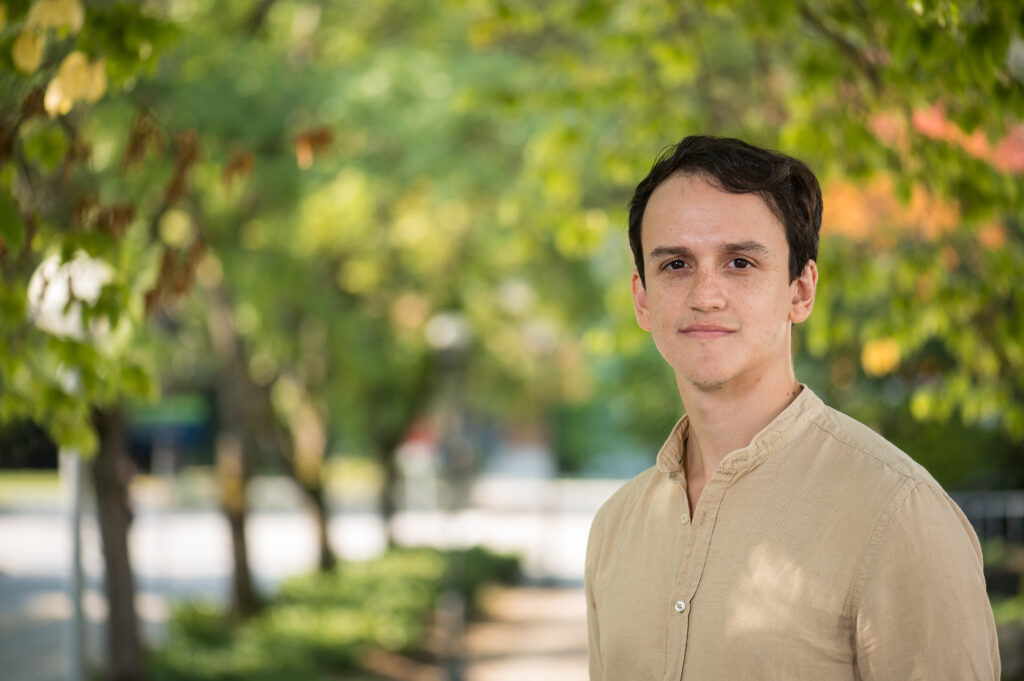
Q#1 What are you working on at the lab?
I am currently working on a paper that explores how open and social annotation can foster different cognitive activities to learn with others. Social annotation is a genre of educational technology that allows users to annotate—meaning, write comments in the margins—different interfaces and media using text, links, and media—either publicly or privately—and to do so while engaging in dialogue with others. This paper comes from a research project we (meaning, Juan Pablo Alperin and Alice Fleerackers from the ScholCommLab, and Remi Kalir from the University of Colorado Denver) conducted in 2019, exploring how social annotation was used in different undergraduate courses at Simon Fraser University. This is very exciting work, and we hope to submit it soon.
Q#2 Tell us about a recent paper, presentation, or project you’re proud of.
Well, alongside my work in the ScholCommLab, I am most interested in the intersection of literacies, technology, and society. And, within this intersection there is a lot of space to be on projects that I am very proud of! For example, right now I am working on my comprehensive exams for my doctoral candidacy, where I am (among other things) exploring social media literacies from a conceptual and methodological standpoint... which is very exciting for me.
I am also proud to have a presentation accepted to the American Educational Research Association (AERA) conference in 2021, where I will be talking about data literacies in the context of Colombia’s peace education efforts. Finally, I am proud of being selected to be part of the Public Scholars Initiative at the University of British Columbia, a network of students who promote engaged scholarship with communities.
Q#3 What’s the best (or worst) piece of advice you’ve ever received?
Oh, there are so many! One of the best ones I can think of is from Grant Snider, an artist who drew this comic called "Disclaimer," where he argues: “you can be anything you want to be… but can you be everything you want to be?” It reminds me of the importance of making personal and professional choices with care and a long-term view.
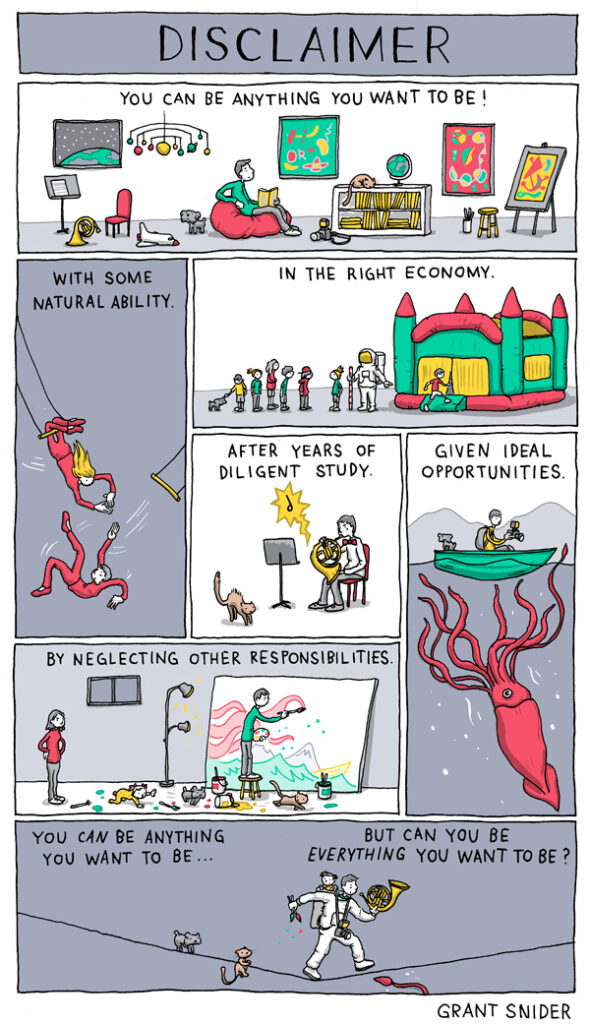
Find Esteban on Twitter at @estebanmoralesv.
Blogging your research: Tips for getting started
This post is a collaboration between ScholCommLab member Alice Fleerackers and SFU Knowledge Mobilization Officer Lupin Battersby. It was first published on November 18, 2020 at SFU Library's Radical Access blog and has been reposted here with permission.
Curious about research blogging, but not sure where to start?
In this post, we answer common questions about why, when, and where to blog about research. Inspired by a recent SFU Knowledge Mobilization Hub webinar on research blog writing we weave in best practices for effective knowledge mobilization, and offer helpful resources for entering the world of research blogging.
What is a “research blog”?
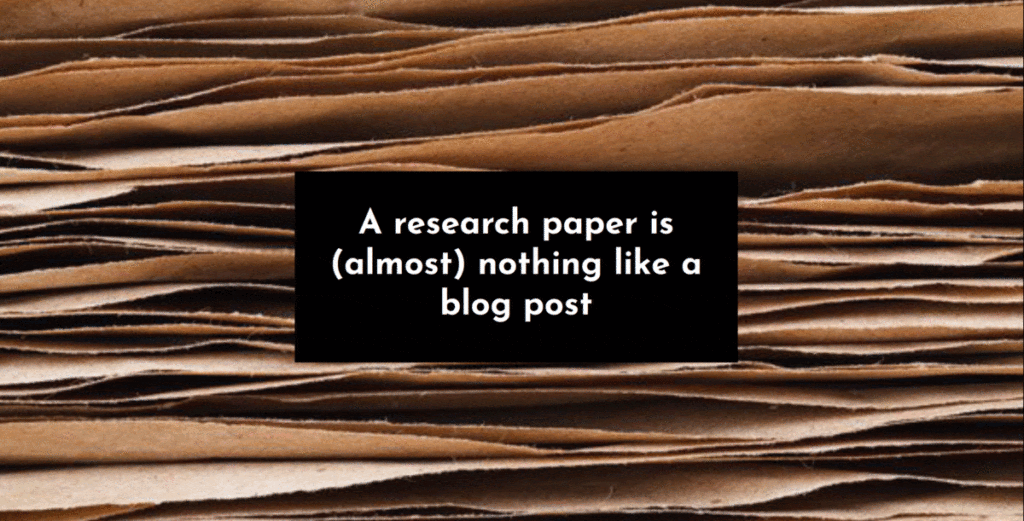
Research blogs can take many forms, from commentaries to summaries. But, at the most basic level, all research blog posts should have two things in common:
- Scholarly: True to their name, research blog posts incorporate scholarship in some way. That could look like a detailed overview of a recent study, a deep dive into a new method, a summary of key findings, or something else entirely. While many scholars blog about their own research, you can also use blogging to comment on work by others in your field.
- Web-friendly: No matter what the topic, effective blog posts are written and formatted with the online reader in mind. That means they should include clear language, plenty of visuals, and a mobile-friendly design. Different bloggers have different styles, but most posts tend to be between 500 and 2,000 words long.
How to write effective research-based blog content is a topic for another post. But to get you started, here are some basic research blog formats to explore:
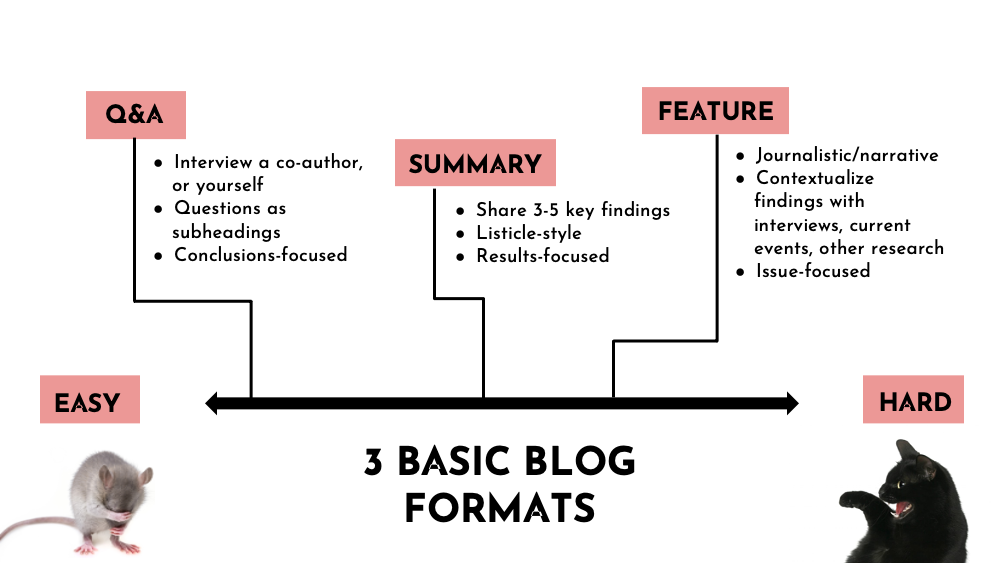
Why to blog about your research
Research blogging is a form of knowledge mobilization that can help get the right information to the right people at the right time. Blogging your research can reduce research waste, improve access, build awareness, and increase connections.
A research blog can boost your impact within and beyond academia, benefiting you professionally and personally. Well crafted posts can increase the reach of your publications and lead to further collaborations and opportunities. They can also become tools to close the loop with participants and engage stakeholders with your topic area. Connecting with your community and knowing that your research is being read is deeply satisfying.
Plus, blogging is a great way to practice plain language communication—excellent preparation for conference presentations and lectures.
Deciding where to blog
The best place to start blogging will depend on your time, budget, skills, experience, and goals. A few common options include:
Create your own blog
If you plan to do a lot of blogging, consider starting your own website. Code your own if you have the skills. (If you need to purchase hosting, Reclaim Hosting offers a very affordable student plan.) Otherwise, you can create a free or low-cost blog using services like WordPress, Wix, or Squarespace. You may also be able to add a blog to your existing website, especially if you are already using one of these services.
Starting your own blog has the advantage of control: It’s up to you how often to blog, what style and tone to use, and what topics to cover. But it has the disadvantage of time and effort. Running (and promoting) your own site only makes sense if your schedule allows for it.
Blog on a third-party platform
If you only plan to blog from time to time, posting on a third-party site can be a good option. Platforms like Medium or Write As offer a space where anyone can publish content for free. These platforms are designed for the web and easy to use. (No coding required!) Some also offer extra features, like newsletters and analytics, though these can cost extra.
Third-party platforms have the advantage of letting you post professional-looking blog posts without having to start an entire blog. But the disadvantage is that you have less control over your content. Medium, for example, is notorious for changing its business model. It’s always possible that, one day, everything you’ve posted there will disappear.
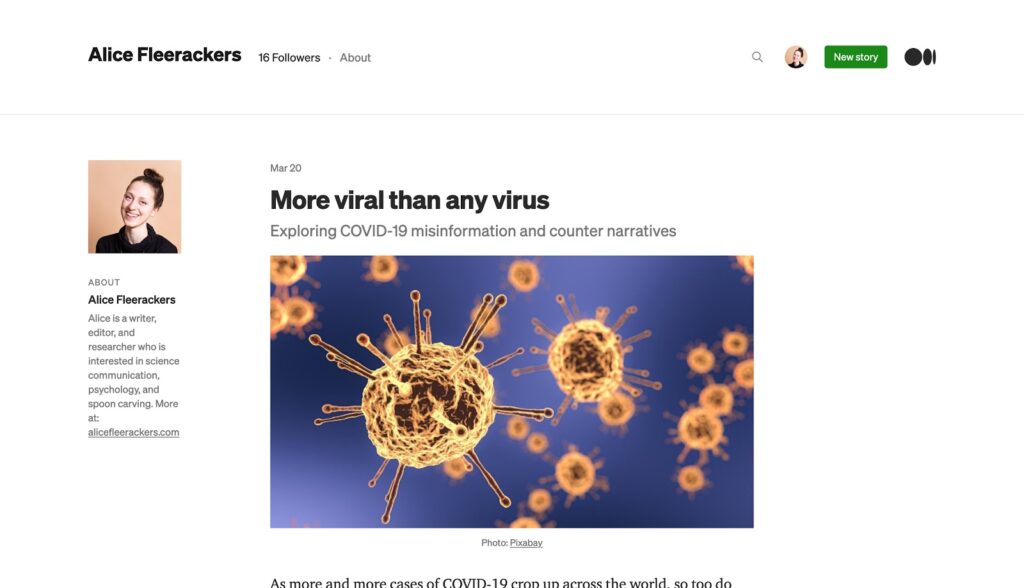
Guest post on another blog
Does your university library or your faculty have a blog? If so, contributing a guest post is an option worth considering.
Guest blogging makes a lot of sense when you are just starting out, or only plan to blog occasionally. Because there’s already a built-in audience for the blog, there’s less pressure to promote the content to reach readers. If you’re lucky, you may even get some editorial support from the blog you’re writing for.
Just remember that you’ll need to tailor your writing style and topic to suit the blog you’re posting on. Again, the trade off for less effort is less control.
Setting a (workable) blogging schedule
Good blogging takes time—and, for researchers, time is often in short supply. Even outside of academia, many blogs fail because the person running them has overestimated their capacity to keep things going.
Avoid this trap by being honest with yourself from the get-go. Sit down and evaluate how much time you can realistically contribute to blogging before even writing your first post. While posting frequently can help boost your blog’s Search Engine Ranking, posting consistently is more important. Whether you’re publishing a blog post once a week, once a month, or once a year, it’s easier to build a following online when you stick to a set schedule.
Choose the platform that makes the most sense for your capacity (see “Deciding where to blog”). Set a schedule that you think you can maintain, then stick to it!
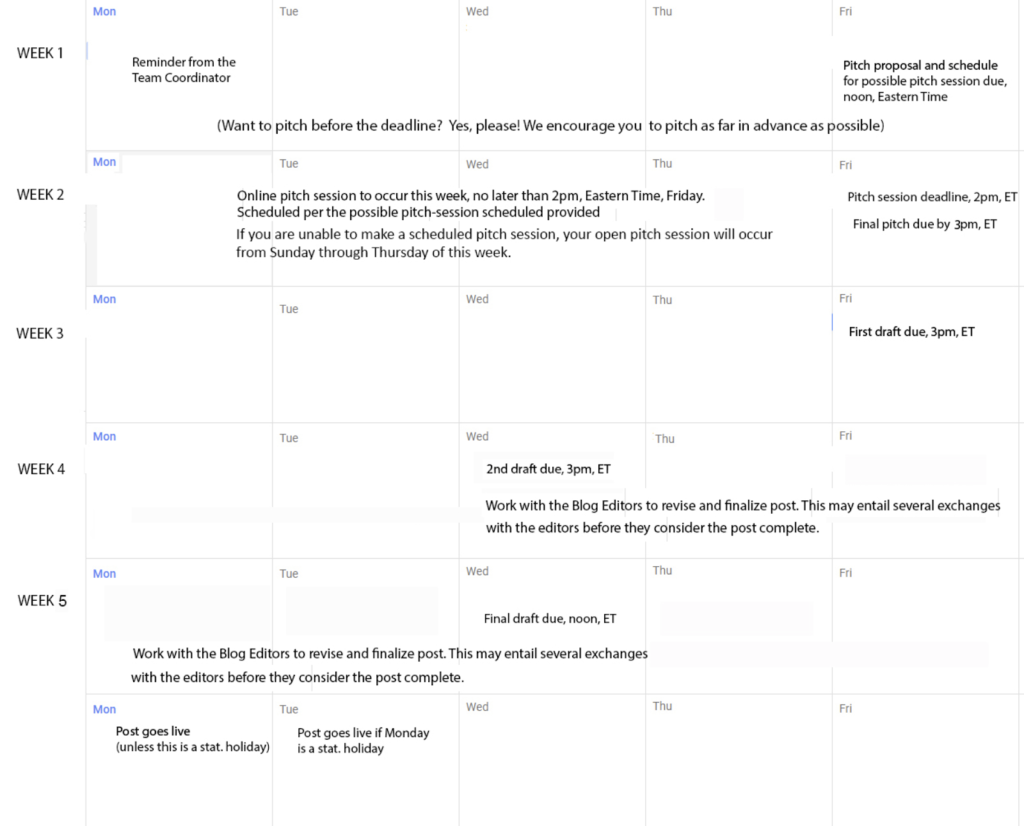
Promoting your posts
Once you have a blog set up, you’ll need to find some readers.
There are lots of different ways to promote your blog. Sharing posts on social media is often a good start, especially if you already have a following there. Depending on your target audience, promoting new posts through a newsletter or an email listserv could also work.
Reaching out to existing blogs in your field can be another effective strategy. Some blogs will let you write a guest post that includes a link to your own blog. Others, like Library Journal’s infoDOCKET or LSE Impact Blog may want to “reblog” your content. Reblogging and guest posting are a win-win for everyone: The blog you’re contributing to gets free, high quality content. In return, you get to introduce yourself to a relevant community of readers.
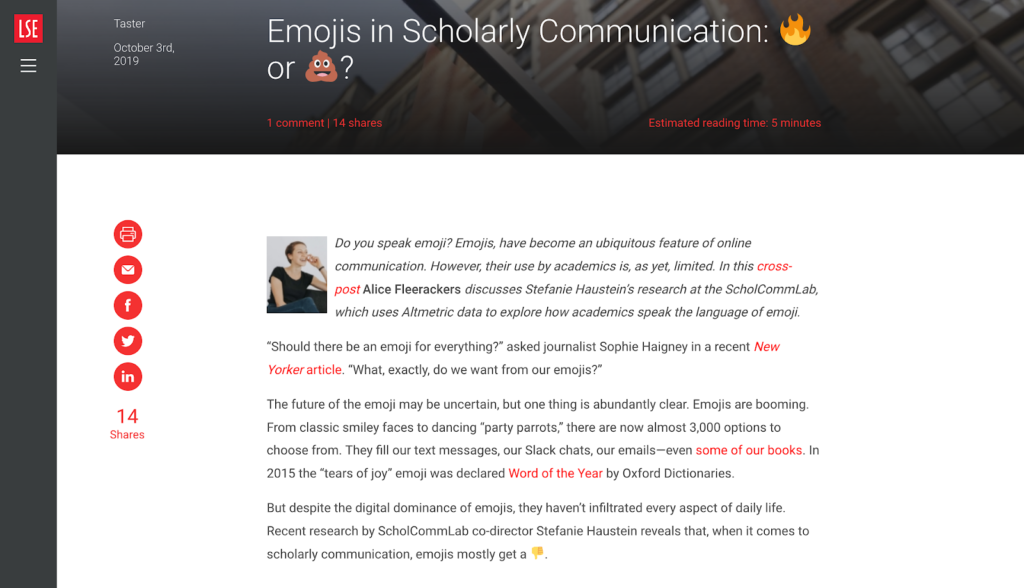
Setting worthwhile goals
Before you start on the metrics, set yourself short- and medium-term goals. What will success look like for you?
This could range from improving your lay writing skills, to building interest in a problem space, to expanding your reach. Ensure it makes sense for you in terms of the scope of your research and your resources (e.g. time). Then determine what to track and measure.
Tracking and measuring success
Many platforms, like Wordpress, Squarespace, and Medium, offer built-in analytics. Most websites are also compatible with Google Analytics or a similar alternative. All of these tools let you track metrics like number of daily users, time spent per post, most popular posts, and more. These metrics can give you insights into how your content is performing and who you are (or aren’t) reaching.
Just like any metrics, it’s important to consider qualitative measures as well as quantitative ones. How long are people staying on your website? Are they leaving comments? Are they sharing it on social media? Depending on the kind of research you’re covering, the answers to these questions may be more important than how many clicks you’re receiving.
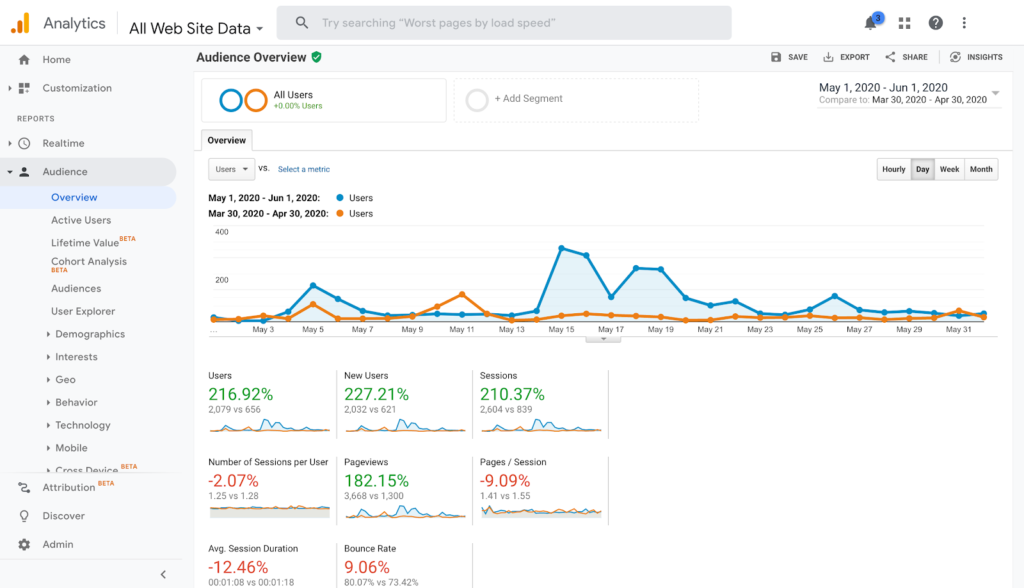
Most of all, use your analytics responsibility. It can be easy to get caught up in the numbers and forget the big picture. Let these tools guide you on how to improve your content and outreach to achieve your goals. But don’t let them mean more than they do.
Research blogs to explore
Looking for inspiration for your first post? Familiarizing yourself with what’s available in your field is a simple way to decide on a style and topic for your own blog. Plus, reading other blogs is a great way to get your creative juices flowing.
Luckily, there are tons of amazing research blogs out there to explore. Below, we’ve listed just a few of our favourites, but there are many, many more. Enjoy!
Researcher- or research group-led blogs
- Iva Cheung (Publishing; Communication; Knowledge translation)
- The Saucy Scholar (Women’s & Gender Studies; Critical Cultural Studies; Queer Scholarship)
- Feel Healthy with Dr. Scott Lear (Health science)
- ScholCommLab Blog (Scholarly communication; Science communication)
Institution- and organization- led blogs
- Knowledge Nudge (Knowledge Translation; Healthcare)
- Black Perspectives – AAIHS (Black Intellectual History; Diverse fields)
- LSE Impact Blog (Scholarly communication; Social sciences; Academic impact)
- Digital Orientalist (Digital Humanities; Cultural Studies; Various disciplines)
Blogging networks and collectives
- Science Borealis (Canadian science, various)
- Culturally Speaking Blog @ Psychology Today (Mental Health, Culture, Race)
- Hypotheses (Humanities, various)
- Platypus, the CASTAC blog (Anthropology of Science, Technology, and Computing)
This work is licensed under a Creative Commons Attribution-NonCommercial 4.0 International License.





